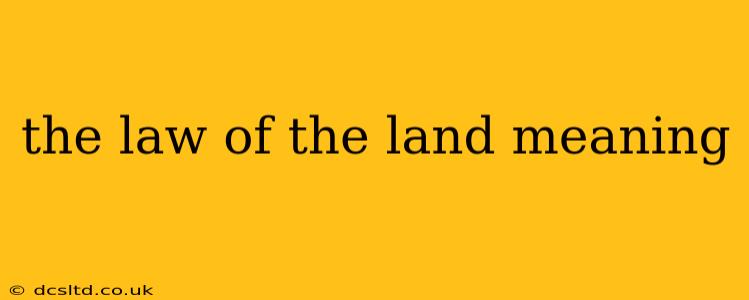The phrase "the law of the land" refers to the supreme law within a particular jurisdiction. It encompasses the entire body of legally binding rules and regulations that govern the citizens and institutions within that territory. This isn't just about statutes passed by a legislature; it includes constitutional principles, judicial precedents (case law), and regulations enacted by administrative agencies. Essentially, it's the totality of legal authority that dictates how society operates and individuals must behave.
Understanding the nuances of this phrase requires examining several key aspects:
What exactly constitutes "the law of the land"?
"The law of the land" isn't a monolithic entity. It's a complex web woven from various sources:
-
Constitutional Law: This forms the bedrock. A nation's constitution lays out fundamental rights, the structure of government, and the limits of governmental power. In the United States, for example, the U.S. Constitution is the supreme law of the land, overriding any conflicting state or federal laws.
-
Statutory Law: These are laws passed by legislative bodies (e.g., Congress, state legislatures). They cover a vast range of topics, from criminal offenses to traffic regulations to taxation.
-
Administrative Law: Government agencies create rules and regulations to implement and enforce statutory law. These regulations often have the force of law.
-
Common Law/Case Law: This refers to laws established through judicial decisions. When courts interpret statutes or apply legal principles to specific cases, their rulings become precedents that guide future decisions. This body of law evolves over time as courts address new legal issues.
-
International Law: While not directly "the law of the land" in a domestic context, international treaties and agreements ratified by a nation can significantly influence its domestic laws.
What are some examples of the law of the land in action?
The application of "the law of the land" is pervasive and impacts daily life. Consider these examples:
- Driving regulations: Speed limits, traffic signals, and licensing requirements are all part of the law of the land, ensuring road safety and order.
- Contract enforcement: The legal framework governing contracts ensures that agreements are upheld, fostering trust and facilitating commerce.
- Criminal justice system: Laws defining crimes, setting punishments, and regulating law enforcement procedures are fundamental aspects of the law of the land, maintaining social order and security.
- Property rights: Laws defining ownership, usage, and transfer of property protect individual rights and contribute to economic stability.
- Taxation: Laws governing tax collection are critical for funding government operations and providing public services.
How does the law of the land differ across countries?
The specific content and application of "the law of the land" vary significantly across nations, reflecting different histories, cultures, and political systems. A nation's legal system may be based on common law (like the U.S. and the UK), civil law (like France and Germany), or a hybrid system. These differences affect how laws are created, interpreted, and enforced.
What happens if a law conflicts with the law of the land?
If a law conflicts with the supreme law of the land (usually the constitution), the conflicting law is generally invalid. Courts have the power of judicial review to determine the constitutionality of laws, striking down those that violate fundamental rights or exceed the limits of governmental authority. This ensures that the supreme law remains supreme.
How is the law of the land enforced?
The enforcement of the law of the land is a multifaceted process involving various actors:
- Law enforcement agencies: Police, sheriffs, and other agencies are responsible for enforcing criminal laws and maintaining public order.
- Courts: Courts resolve legal disputes, interpret laws, and impose penalties for violations.
- Government agencies: Regulatory agencies enforce laws and regulations related to specific sectors (e.g., environmental protection, workplace safety).
Understanding "the law of the land" is fundamental to comprehending a nation's legal and political system. It's the framework that shapes society, protects individual rights, and maintains order and stability.
